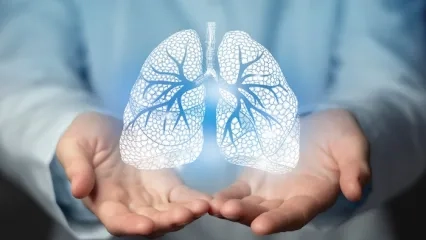Alo Yeditepe
Alo Yeditepe
Long Journeys Increase the Risk of Embolism!
These Precautions Taken Before Traveling Against the Risk of Embolism Are Vital importance!
During the holiday season, the frequency of long journeys, especially by plane, bus and car, is increasing. Chest Diseases Specialist Dr. Seda AKDUMAN points out that the risk of embolism may increase due to long periods of inactivity on these trips. Dr. Lecturer Seha AKDUMAN pointed out that the risk will increase as the duration of the journey increases. Dr. AKDUMAN pointed out that although this problem concerns the whole society, the risk is much higher in those with chronic diseases such as COPD patients, cancer patients, those with obesity, heart patients, pregnant women and those using birth control pills.
Embolism, which is generally defined as the movement of a blood clot resulting from deep vein thrombosis (DVT) in the legs to another area through the bloodstream and blocking a vein there, can result in loss of life, especially when it affects vital organs such as the lungs. Dr. AKDUMAN stated that although it is of vital importance, there is not enough knowledge and awareness about this issue, and that not enough fluid is taken, especially during the journey. Dr. Lecturer Seha AKDUMAN said, “The body becomes dehydrated due to insufficient fluid intake. When inactivity is added, blood circulation in the veins of the circulatory system slows down and, accordingly, the risk of clot increases. Low cabin pressure and humidity levels, especially during air travel, also cause blood to darken. In conclusion, it is possible to say that inactivity, low cabin pressure and humidity level, and insufficient fluid intake are risk factors for embolism.” she said.
Beware of Unilateral Leg Swelling!
Stating that sudden chest pain and shortness of breath suggest embolism, Yeditepe University Koşuyolu Hospital Chest Diseases Specialist said: “In addition, unilateral leg swelling is also very important. During embolism, clots first form in the legs. And when this clot travels to the lungs, complaints begin to appear depending on the size of the clot. "Although there are no complaints in very small clots and the clot passes suddenly, complaints such as shortness of breath and shortness of breath occur, accompanied by a sudden onset of low oxygen." said.
“When Complaints Start, One Should Apply to the Hospital Without Wasting Time”
Underlining that embolism is one of the emergency situations, our expert continued her words as follows: “When a complaint occurs, it is necessary to apply to the nearest health institution. It should not be forgotten that the rate of loss of life is high in untreated clots. "The sooner the treatment is applied, before the heart is affected, the more successful the treatment and getting rid of the negative effects of the embolism will be." However, our expert reminds that the risk is higher in people who have had this problem before than in the normal population, and says, "The risk of loss of life in the second embolism increases, especially in patients whose lungs or heart are affected." She said.
Do not go on a journey without taking these precautions against the risk of embolism!
Underlining that although long journeys increase the risk of embolism, it is possible to manage this risk with precautions, the Chest Diseases Specialist made the following suggestions.
Move Regularly: Get up and walk every 1-2 hours, especially on long plane rides. If this is not possible, improve blood circulation by moving your legs and ankles. When traveling by car, be sure to take breaks and walk.
Drink Plenty of Water: Although many people do not prefer to consume liquids while traveling, one of the precautions that should be taken is to keep your body hydrated by drinking enough water. In addition, limit caffeine and alcohol consumption as they have dehydrating properties and can leave the body dehydrated.
Choose Comfortable Clothes: Choose comfortable and loose-fitting clothes as much as possible, as tight clothes can hinder blood circulation.
Use Support Stockings: Specially designed support stockings (compression stockings) can prevent clot formation by increasing blood circulation in the legs. It is very important, especially for people in the risk group, to go on long journeys with these socks.
Consult Your Doctor: Talk to your doctor before long trips, especially if you have had a DVT or embolism before. If necessary, you can use anticoagulant medications.
About
Faculty and Year of Graduation:
Gazi University Faculty of Medicine, 2007
”
See Also
- How to Cleanse Your Lungs?
- Is Breathing Air Dangerous in Fires?
- What is Electronic Cigarette Disease (EVALI)? EVALI Symptoms and Treatment
- What is COPD? Symptoms and Treatment of COPD
- What Asthma and COPD Patients Should Pay Attention to When Using Air Conditioning!
- What is Allergy? What are the Symptoms of Allergy?
- What is Desert Dust? Harms of Desert Dust
- Lung Cancer Screening Age
- What is Good for Cough? How to Cure Cough?
- Lung Cancer Symptoms and Treatment
- 10 Ways to Have a Sound Sleep in the Heat
- What Should Asthma Patients Be Cautious About?
- Does Poor Quality Sleep Increase The Risk of Asthma?
- What Causes Insomnia, Diagnosis and Treatment
- 9 Common Misconceptions About COPD
- Causes, Symptoms, and Treatment of Asthma
- Allergy and Asthma During Pregnancy
- It Is Aimed to Eliminate Tuberculosis Worldwide By 2030
- Lung Patients Should Not Stop Their Medications
- 4 Significant Preliminary Symptoms of Lung Cancer
- How Does Acid Rain Affect Human Health?
- The Slowing Traffic in Istanbul Increases the Risk of Cancer!
- The American Cancer Society Has Announced; The Age of Screening For Lung Cancer Has Decreased
- Hidden Lung Cancer Cases Revealed in Tomographs Taken Due to Coronavirus
- Obesity is Both a Cause and Consequence of Sleep Apnea
- Asthma and COPD Attack Season Begins
- Lung Cancer
- Snoring and Its Treatment
- Using Antipyretics Uncontrolled Can Hide Pneumonia Symptoms
Alo Yeditepe




